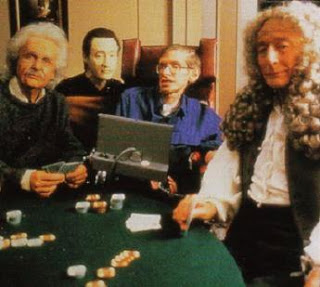I woke up this morning to the news that legendary theoretical physicist Stephen Hawking had passed away.
Hawking held an undoubtably important place in modern culture. Through his improbable battle with ALS (he was diagnosed at 21 and given two years to live) he became uniquely recognizable. "That guy in the wheelchair" brought the arcane and abstract world of cosmology to a wider audience.
I was first exposed to him in the season six finale of Star Trek: The Next Generation. I would have been about eight years old.
L to R, Albert Einstein, Data, Stephen Hawking, Isaac Newton... go figure.
My family happened to have a copy of his New York Times bestseller, A Brief History of Time, on the shelf. It was one of those books that lots of people bought but few actually read. I tried to read it and it wasn't that difficult. That book contained a lot of important lessons for a young person!
The idea that runs through the book is that the universe is explicable. Not necessarily explainED but explicABLE. (At that point our current best estimate for the age of the universe, 13.8 billion years, was still about a decade away.) While the world might be complicated, the explanations aren't forever hidden over the horizon of human knowledge. Sometimes, we actually have too many possible explanations and are waiting for a way to tell between them. He also spent most of his time talking about Black Holes and the beginning of the universe; pretty cool stuff. Once you start thinking in those terms, it's hard to turn back.
More recently, he has made guest appearances on The Big Bang Theory and had an Oscar nominated feature film about his early life on his way to his PhD, The Theory of Everything. So I hope I'm not the last generation to be inspired by his life and work.




